|
The RESPECT Campaign, launched by Canine Behaviour Guernsey and supported by the GSPCA, is about encouraging dog owner etiquette in an attempt to reduce the amount of out of control and anti-social dog incidents in the island. It aims to help dogs, their owners and people feel safer and understood. The below gives some examples of how it can be applied.
Recognise. Guernsey is a small island; it is heavily dog populated and we are all sharing the same space. We need to respect everyone around us. Many issues are caused by ignorance - people simply not realising what are good canine social skills or not recognising each other’s needs. The law states that owners must have control of their dogs at all times. If your dog cannot be recalled, please don’t let them off the lead. Evaluate. Assess each and every situation. Who and what is around? Is it safe to continue? When walking your dog, check the environment and your surroundings. Should you walk your puppy along a busy path with lots of children on their scooters where they could easily spook, or can you go a different way to prevent a problem? Is it safe to let them off the lead? Is there a horse on the beach, sheep in a nearby field or a family having a picnic? If so, could you go elsewhere to prevent a problem? Please never let your off-lead dog approach an on-lead dog as they may be on-lead for a reason. This can also be applied to the wider public, could you give the dog you see out and about a bit of space? If not, perhaps you could slow down to pass. Zooming past in close proximity can cause any animal to spook. Never run straight up to or shove your hand in a dog’s face. Always ask to say ‘hello’ and if the owner says ‘no’, please respect their decision. Sympathise. Think about others and be conscious of their circumstances and feelings. Can you help them out? A lot of dog owners are actually doing their very best. You may have never had a reactive dog before or one that has a habit of stealing other dogs’ balls, but it doesn’t mean that the other owner isn’t aware of the problem and isn’t trying to work on it. Be sympathetic, if someone is calling their dog off your dog’s ball, help them by stopping throwing it until they have left the vicinity. If you can see a dog isn’t coping well, or a dog is in training, give them space and go a different way, or pull in to let them pass. If a dog is following you and their recall has failed, just stop still and wait for the owner to get control of the dog. A ‘blow you Jack, I’m alright’ mentality, is only going to cause more upset and issues so please think of others. Politeness. Be polite to others. Kindness goes a long way. If a dog is pestering you or your dog, ask the owner politely to put them back on a lead. Stay calm, if you get stressed and angry that will feed onto the dog. If someone asks you to put your dog back on the lead or give them space, respect their request and politely do so. Your dog may be friendly and well-trained but theirs might not be. A person or their child might be scared of dogs. Be courteous, people will appreciate it. Even an incredibly well-trained dog can have a recall fail, if your dog’s recall does fail, apologise to those around you and revisit training. And please pick up your dog’s mess. Education. We can all help by learning more about how dogs behave, their body language and what it means. With so many dogs in society, it has never been more imperative to learn canine body language. A waggy tail just means adrenalin but that can also be caused by anxiety so that dog has the potential to bite if its signals to go away are ignored. A properly funded education programme in schools would go a long way. Owners have a responsibility to educate themselves on the species before bringing a dog into their life - is it the right decision for them? Is the breed or rescue dog they want the right dog for their home-life and lifestyle? Are they prepared to put the time, money and hard work in to train the dog? Canines will be canines. Dogs are not humans and have species-specific needs. Recognise this and think about what is natural for dogs. Expectations of dogs have become ridiculously high. Dogs are a victim of their own success and people expect every dog to behave like the therapy dog down the road or like the hero dog on the TV. A dog is still an animal with canine instincts. They have species-specific needs and have a brain and emotions of their own. Even the most robust of animals can have a bad day, including the therapy dog down the road! So don’t take them for granted. Owners need to think that what is natural for a human socially, may not be natural for a dog. Artificial social situations can be incredibly stressful for many dogs, some struggle to cope out of fear and others struggle to cope out of excitement, both can lead to bad habits, poor manners and aggressive behaviour. Meet, greet and play is actually only 20% of teaching social skills, 80% is actually helping the dog to learn that stimuli are neutral - neither threatening or over-exciting. An ethical and qualified trainer can help you understand this more. Train. Training any dog is imperative to keep them and others safe. A dog is a HUGE responsibility and you have to be prepared to invest the time and money into training. If you decide to get a dog and you have done your homework, the next step is to enlist in an ethical and qualified trainer. You need to train your dog essential life skills to ensure that you keep them and everyone around you safe. Attend puppy classes and do 1-2-1 sessions - all will be of benefit. For more information about RESPECT or if you would like help training your dog please email [email protected].
0 Comments
Bonfire Night is always a real cause for concern for animal owners because some pets can be really afraid of the loud noises and the reverberations that fireworks give off. Animals can be left extremely traumatised by the events and for those who are extremely terrified, there is always a concern that they might hurt themselves. With Bonfire night itself, the shear number of firework displays across the island means there is simply no where to go to avoid it.
With dogs in particular, their hearing is much more sophisticated than ours and they can hear sounds coming as far as a kilometre away. If we aren’t expecting a loud bang such as a firework, gun shot or pang of thunder, we would jump so imagine what it is like for an animal who has even better and more sensitive hearing than us. The difference is with humans we know its Bonfire Night and to expect it while they have no idea what is happening. We also have the ability to rationalise which is something they can’t do. As our dogs get older, they can become less tolerant to loud noises, so while a dog might have coped okay with Bonfire Night last year, it does not mean that they will be fine this year. The best thing you can do if you are an animal owner is to stay in with your pets and make sure they are safe and secure inside and comforted. If you know your animal is extremely terrified by fireworks and their is a fear that they might hurt themselves then it is best to speak to your vet to see if there are any medications that they can prescribe to help. Please don’t take your dog to a firework display. They need to be inside, in the comfort of their own home with you by their side. I will be staying in with my three dogs and snuggling up in front of the television. My dogs have previously been okay with Bonfire Night but as they get older, I can’t say for sure how they will cope in the future so I would never leave them at home by themselves. Some people do ask if there is anywhere they can go to avoid the displays. Unfortunately I don’t think there is anywhere in Guernsey where you could take your pets on Bonfire Night and them not hear anything. Even if you park up in a cliff car park, your pets would still be able to hear fireworks from all around. Like I have said above, the safest place for them to be is at home. This way we know they are safe and secure. Other top tips to help your dogs on Bonfire Night include: -Shut the windows and curtains -Turn the TV up really loud -Try to act as normal as possible -Make them a den -Use calming products -If in doubt, play with them or get them sniffing -If they need to go out to the toilet take them out on lead Some dogs may appreciate it if you create them a den, perhaps using the dining room table and draping some blankets over it so that they have somewhere to hide if they want to go there. We mustn’t force them to go there, it has to be their choice but some dogs do like somewhere to hide and feel safe. Owners could also use some over-the-counter calming products if they are worried. These include Adaptil, which sends out a pheromone mimicking the mother dog’s scent, or Pet Remedy. You can also buy ‘Thunder Jackets’, which are like a wrap around your dog’s body and can be calming as they act a bit like a hug. If your dog is showing signs of anxiety, please comfort them if they want to be comforted. You can also try and play with your dog to try and take their mind off what is going on outside. Light scentwork games are also a good idea, such as scatter-feeding treats around the house, as this is an incredibly calming activity for them to do. If you need to take your dog out to the toilet on Bonfire Night or when there are firework displays going off, please pop them on a lead, no matter how secure you think your garden is, because we would hate for them to get so scared that they would try to run off. It’s better that you have them on the lead so you can get out and back in as quickly as possible. If anybody’s dog is terrified of loud noises or fireworks, there is a programme of behaviour therapy work that we can do to help. However, this must be done months and months in advance as it takes a long time so it is best to seek assistance with this as soon as possible. My advice for islanders in general would be that if you can attend a public organised event instead of holding your own display then this would really help. It would mean there would be less displays and less random bangs going off left, right and centre. However, I understand some people will want to hold their own and if that is the case then, no matter how small, please register your private display with the authorities so that animal owners can check what displays are happening in their area so they can be prepared. Following the news this lunchtime of lockdown, Canine Behaviour Guernsey will be moving all appointments online wherever possible. We shall be in touch with you ahead of your sessions to arrange this or to reschedule wherever necessary. It is likely we do this on a day-by-day basis given the nature of the situation. Please bear with us as we go through the diary.
Classes will be postponed until further notice. We will continue as soon as we have the all clear to do so. In the meantime, we will be launching three online support programmes. One for puppies, one for adolescence and older dogs and Petsercise online will also be making a return. The puppy programme and the one for older dogs will include life skills training and activities for you to do with your dog, but they will also provide you with support and advice as to how you can prevent any lockdown related issues. We have experienced the affects of the last lockdown on the island’s canine community, not just on puppies but also on adolescent and older dogs. Therefore, we feel it is really important to help you prepare for the next few weeks and to advise you as to how you can prevent any future social or separation anxiety related issues. Details of the programmes are as follows. Please email [email protected] for more information or to book your places now! Puppy Programme for dogs up to one year - £60 * Daily Training and Life skills activities * Enrichment & mental stimulation activities * How to prevent socialisation issues * How to prevent separation anxiety * Why Does My Puppy...? Webinar - A two-hour presentation to help you understand your puppies better & what you can do to help with those unwanted behaviours. Adolescence & Adult Dog Online Enrichment & Activity Programme - £40 * Daily Training & life skills activities * Enrichment & Mental Stimulation activities * Physical activities & exercises for your dog * How to prevent social issues for older dogs * Separation anxiety prevention 12 Days of Petsercise - £20 * Daily physical exercises for you and your dog * Professional dog training support * Personal trainer support for you As we enter another two week's of lock-down thanks to the Coronavirus Pandemic and more people are having to self-isolate, we at Canine Behaviour Guernsey want to reassure islanders that there are a number of things you can do to help your dog if you find yourselves unable to take them for a walk.
The States Vet has confirmed that anyone who is required to self-isolate or is the subject to a quarantine order must not leave the house to walk their dog or attend to other animals. They may exercise them in their own private garden but if they have any animals located elsewhere, they are asked to make arrangements for someone else to care for them while they cannot. Canine Behaviour Guernsey understands that owners may have concerns about not being able to exercise their dogs outside of the house, however it is important for the safety and health of the island’s community that we all listen to the government’s guidelines. As such, we have put together our top five tips to ensure our dog’s needs are still being met even if they cannot go for walks. ‘In normal day-to-day life, it is part of a dog owner's routine to go for at least one walk a day,’ said Canine Behaviour Guernsey’s founder and owner Anna Jane Brehaut. ‘Exercise is indeed important to the welfare and wellbeing of our dogs. However, we are not in a period of normality and it is essential that those who are being told to self-isolate or quarantine listen to the powers that be for the safety of islanders. ‘Our dogs are more resilient than we sometimes believe - they will survive without a daily walk for a week or two if needs be. Dogs are quite often placed on ‘box rest’ if they are injured or are poorly and rest days are also advised on occasions for those suffering from extreme anxiety. ‘However, if our dogs are not going for walks we do need to make sure that their needs are met in other ways. That is why we have devised our top tips - to help people understand those needs and how they can meet them.’ In addition to the top tips, Canine Behaviour Guernsey is also offering two online training programmes, which include enrichment ideas, ways owners can exercise their dogs in the home as well as activities to keep their dogs mentally stimulated. Two webinars are also planned, one for puppy owners and another looking at recall. A total of 20% of the proceeds from the webinars will go towards the GSPCA’s Crisis Fund. Lorna Chadwick, GSPCA Welfare manager, agreed that it was important to ensure our pets mental and physical needs are met. ‘We now have more time on our hands and therefore no excuse,’ she said. ‘Owners can follow online programmes, watch webinars and spend time helping their dogs become happier pets; and in doing so reduce the likelihood of any behaviour problems arising out of frustration and stress during this difficult time. ‘Invest in your pet and help them as much as they are no doubt helping you.’ For more information regarding how to meet your pets needs or the programmes and webinars available please contact Canine Behaviour Guernsey at [email protected]. TOP FIVE TIPS: *Play Play is both mentally and physically stimulating for a dog. Get the toy box out, make it fun and enjoy some games of tug of war, fetch & retrieve and hide & seek! *Encourage sniffing Dogs were born to use their nose and sniffing is a great mental workout for them. If walks are off the table, it is important that we give our dogs an outlet to use this natural behaviour. Scatter-feeding and hiding food/treats in boxes and around the house are all great ways to do this. *Train Remember all those tricks and cues that you’ve always wanted to train your dog to do? Well, now is your chance! Fancy spins, leg weaves or even shutting the door! Keep sessions short, frequent and fun and use hands-off, positive reinforcement techniques. (If you’re worried about treat consumption, use their food to train or reduce meal portions accordingly). *Stay Calm It’s easy to get caught up in the stress of the pandemic but what we forget is the impact this might have on our dogs. They will sense our stress. So encourage calm wherever possible. Give yourself regular breaks, breathe, snuggle up and spend some quality time with them relaxing. *Remember regular toilet breaks Some dogs are not that great at letting us know when they need the toilet so it’s important we give them regular access to the garden or a safe space so they can do their business. Don’t be afraid to ask for help if you need it. Petsercise Gsy is launching an online campaign this festive season! The 12 days of Petsercise will be available on Facebook from the 25th December up until the end of January 2020.
For many, Christmas is a time where they overindulge, exercise regimes go out of the window and our pets' routines get left behind. Normally, exercise programmes would get released on the 1 January when people make their new year’s resolutions to get fit. But at Petsercise Gsy, we aren’t about fad diets and burn-out exercise programmes, we promote happy and healthy lifestyle choices. Christmas can also be a tough time for our animals, who like the comfort of routine. For some dogs it can be quite worrying as they do not know what is happening - quiet households are turned into party venues with guests popping by left, right and centre. We get so busy buying and wrapping presents, cooking delicious treats and partying that we forget that our dogs’ bodies and minds need to stay active. So the 12 Days of Petsercise is aimed at getting people to commit to their health and pets during the festive season. Each of the 12 days of Christmas, we shall release a short video with one two-minute exercise. Yep, that’s all we will be asking for – two minutes of exercise and dog training each day, reckon we can manage that? Should you wish, you can build your own exercise routine by putting the exercises back-to-back as you go. To take part it will be just £15 if you sign up before the 24th December. If you want to sign up and join in from then on and over January it will be £25. After registration and payment you will be accepted onto a private Facebook group where the videos will be shared. We will also be providing regular tips and tricks to keep you motivated and show you how you can build and improve your exercises. For more information and to register please email [email protected]. A NEW campaign to improve animal welfare standards in the island is being launched today.
The Autumn Aversives ‘Amnesty’, launched by Canine Behaviour Guernsey and supported by the GSPCA, aims to raise awareness among pet owners about the damaging effects these certain training products and devices can have on our animals’ physical and mental health. An aversive is something unpleasant that is used to suppress emotions and diminish an unwanted behaviour. This can be an unpleasant sound, a physical correction, the pain caused by an electric-collar, choking or prong collar correction, or a harsh scolding. A wide-range of these items continue to be sold and marketed today with owners understanding little about how they are exactly designed to work. In an attempt to improve that understanding, Canine Behaviour Guernsey is asking all pet owners to hand in any aversive items they might have lying around the house, swap them for ethical training methods and make a firm commitment to raising animal welfare standards in the island. ‘We are using the term “amnesty” lightly because, while you might think they should be, these products are not actually illegal,’ said Canine Behaviour Guernsey founder and owner Anna Jane Brehaut. ‘Whether they should be made illegal is a political argument that has been rumbling on for some time and I expect it will continue to rumble on as long as other priorities continue to take to the fore. ‘However, in the interests of animal welfare we can’t just sit back and wait for the debate to play out for another five, 10 years or so. We want to do something now.’ As a practicing behaviourist for two years now, Miss Brehaut has seen a number of people reach for aversive devices as they look for an ‘overnight cure’. It can lead people down a slippery slope, as if one does not appear to make a difference they try another and another and so on. ‘These devices can be used for all sorts of different things but the most common behaviours I see them being used for are excessive barking, pulling on the lead and other impulse control related behaviours and recall,’ she said. ‘The reality is that if the items are perceived as working, it is only because the dog has been bullied and suppressed into a state of learned helplessness and depression – a sorry state for any living being. ‘The devices can also actually make the behaviour much worse due to association.’ Miss Brehaut is hoping the campaign will also raise awareness of animal mental health. ‘A recent national article reported that 1 in 10 dogs in the UK is suffering from a mental health issue but yet 20% of people believed the dog’s were just acting up for attention. ‘The world has made great strides in understanding and recognising human mental health - we now need to raise awareness that we aren’t the only species who can live with mental health struggles.’ An Amnesty box will be placed at the GSPCA reception desk. People can hand in any aversive item anonymously. ‘We do not aim to criticise or judge anyone who may have used or who are using these products. Many people will not have even realised that the product they are using is aversive and we totally understand that. ‘We have also included anti-pull headcollars and anti-pull harnesses, which aim to stop a dog from pulling through tightening around the snout or body, on our amnesty list because they are also of an aversive nature and there are some great alternative products out there that are more effective and can be used instead in association with training.’ GSPCA Welfare and Behaviour manager Lorna Chadwick, a member of the Association of Pet Dog trainers who has been working with rescue dogs for over 20 years, said dog ownership has changed a great deal over the years. ‘It is no longer necessary, or acceptable, to use harsh methods in training or to use accessories that may cause your dog discomfort when walking,’ said Mrs Chadwick. ‘We have come full circle and now apply behavioural sciences (Pavlov and Skinner) to all of our dog training and behaviour programmes. Pain and fear is not in the best interest of the dog and certainly compromises their welfare as well as compounding any behavioural issues they may have. It is important that any methods or equipment used are kind, fair and effective.’ Anyone who would like more information or would like advice on alternative and ethical training tools and methods can email Miss Brehaut at [email protected] or contact Mrs Chadwick at the GSPCA on 257261. The GSPCA reception will be open from 9am to 5pm Monday to Saturday and 11am to 4pm Sundays. The amnesty will run until Sunday 1 December. Items included in the amnesty list (but not limited to): *Electric shock collars *Air spray collars, including citronella collars * Ultrasonic Bark Control Collars *Pet corrector sprays (or any bottle that has been used as a substitute) *Prong collars *Choke chains *Martingale collars used as choke devices (i.e not fitting properly so it acts as a choke) *Slip leads being used as a choke device for pet dogs (we understand there is a use in sports such as gundog training providing the dogs have been trained to walk loose lead first) *Anti-pull head collars that tighten around the snout *Anti-pull harnesses that tighten around the body Ah, the terrible teens. Yep, it’s not just humans that go through them! We experience them too! Crickey, I remember mine - I was a bit of a handful. Suddenly, just when you think you are getting there, it all just seems to change overnight and the dog reverts to all the annoying puppy-like behaviours that you thought you had trained them not to do. Loose-lead walking returns to pulling, recall goes out of the window, they start chewing cables again, tugging on clothes for attention and well that hole they dug up in the garden three months ago? Yep, that’s re-appeared too. But don’t panic, this is all completely normal.
Like human teenagers, adolescent pups will also start to test the boundaries. This is the age where puppies become more independent and they reach sexual maturity. While females come into season, and along with that come the associated behavioural changes, males experience dramatic fluctuations in their hormone levels. It is a challenging and testing age and it is no wonder that this is the most common time that people give up their dog for re-homing. Holly has undoubtedly hit her adolescent stage and to be honest, she can be a bit of a pain from time to time! Now I know what mum and the family felt when I was this age. My mum must have had the patience of a saint and I will admit that while Holly is testing the boundaries a bit – I don’t think she is quite as much of a handful as I was - but don’t tell her I said that! I used to steal things in adolescence and this became quite troublesome when I experienced that need to guard, as discussed in a previous article. I also demanded to say hello to everyone, having a toddler like tantrum if I didn’t get my way - and my recall? Non-existent. I do appreciate all my mum did for me and I thank her for all her patience! I’m not sure where I would be today if she hadn’t taken the time to keep me on the straight and narrow. Holly’s testing the boundaries in other ways – her lead walking took a step backwards, mainly because she just wants to run and has a paddy if she can’t. She decided to hunt for things to chew when we were left home alone – she chomped her way through dad’s Mac charger – thankfully it wasn’t plugged in (to be honest we are all in agreement that it was his fault for leaving it out in the first place – sorry dad!) And she ripped apart a phonebook – now I’m also going to be honest here and say that I did join in, because, well, the phonebook was already destroyed and she was having such a good time that it was just too tempting to resist! She also likes to dig – the lawn and mum’s pot plants – I don’t see the attraction with this, yuck, mucky paws? Me? Absolutely not! I’m a pampered pooch and hate getting my paws dirty – I’ve left her well alone with that one! So how long does this all last for, you might be asking? Well depending on the breed and size of your dog, it can range but usually it starts at around six months and can go right up until 18 months. In fact, I only really started to calm down when I hit two. Yup, it’s a long time but try to remember that it does not last forever. You will feel like something has gone wrong somewhere and you will be overcome by feelings of failure and frustration at times. But please don’t feel upset and angry – just blame it on the terrible teens! Keep your training sessions short and sweet. Know when is a good time to quit – you should always end on a high. And if you feel like you’re getting frustrated, remove yourself from the situation and count to ten. Just stay patient and consistent, and it will all pay off! Love for now, Murphy  2019 is now in full swing! January saw Canine Behaviour Guernsey go full time and with that it means I have been working out and about a lot more! While we have been out we have noticed many people are walking their dogs on retractable flexi-leads. What is wrong with that? Well, the truth about flexi-leads is they may just be encouraging the very things you are trying to train your dog not to do. People like us to walk nicely on our leads so they can have a pleasurable walk. And that can be the very reason some people buy a retractable lead. If their dog pulls and they have a flexi, there is less strain on their arms when they go for a walk but they still have the comfort in knowing there is a lead there if they need to get their dog back. Flexi-leads make it more convenient for the human – they don’t have to keep stopping and changing direction when teaching them to walk nicely on the lead. They think it’s nicer for their dog as they have more ‘freedom’ to roam. We certainly can see how that convenience is appealing for an owner. However, by their very nature, retractable leads are always tense. They are also heavy so we can feel this as we walk. When they are locked, they are tighter and even tenser. And when they are unlocked, we know that we can pull against the lead to go ahead and investigate all those lovely scents and smells. Let’s think then what this is all teaching us. With a flexi-lead we learn to pull. We don’t learn any self-control, nor do we learn to check in with our handler because if we are out five metres or so ahead then we’re only thinking about one thing – whatever is in our path. This doesn’t help with our recall and you actually have little control over us. They also don’t help us to be calm and relaxed on a walk. Tension can lead to anxieties and frustration on the lead – we dogs feel restricted because we can’t make our own decisions. Another truth? Retractable lead locks can fail. Rescue centres know all too well about this – they have seen so many accidents where a dog has bolted into the road, the lock has failed and in a blink of an eye the dog is injured or killed by the oncoming car. And then let’s think at what happens if you have a reactive dog on a flexi-lead who has gone into fight mode and the lock fails? The consequence doesn’t bear thinking about. So what can you do instead? Ideally, we should be to the side of our humans walking next to them on a nice loose lead with a loop in the middle – this ensures no tension and so a relaxed walk is had by all. It’s so nice to be able to trot alongside mum at our own pace, no pulling, no straining. I can see that she enjoys our walks. We’re trying to teach Holly this concept – it is difficult for a puppy because they get so excited but pawrents have to stay patient and consistent! We walk on two-metre training leads that mum has the ability to shorten if need be, to tie around her waist or even to use a double clip harness. Mum also does loose lead walking exercises with us. And what about recall training? Long lines, or recall lines as some people call them, offer more flexibility for when you are out in wider spaces and practicing recall. A loose lead is a happy lead, Murphy  Hello paw friends! I have a key message to share in this article. It's something very important and something my mum and I feel very passionate about and we want to raise awareness of. Unfortunately though, it's a debate where those on either side can get very territorial about. But at Canine Behaviour Guernsey we don’t get territorial, we look at the facts and treat every dog as an individual. As I write this, I'm feeling rather poorly. I've had an upset tummy recently and now an ear infection and, to be honest, I'm quite fed up. My mum knows when I'm ill because I get quite grumpy - understandably of course - and my guarding tendencies tend to get stronger. I'm not sure why, but, when I feel unwell I feel like I need to cling onto things to protect them. Maybe it's because I don't know what's going on and why I'm hurting so I get anxious and that's how it all comes out. Anyway, everyone knows I'm a resource guarder, I've been rehabilitated but I still sometimes feel like I need to do it - mostly when I'm ill. I know now that there is nothing to be ashamed of though- it is a relatively common instinctual tendency and reinforced very quickly. Think of it please as an anxiety – I am nothing like a demanding child, who knows right from wrong but is trying to get my own way. There are many complex behavioural issues that my dog peers can suffer from. Guarding is just one of them. My pawrents know how to manage and control my incidences of guarding and they have counter-conditioned my responses so now, if I have something that will harm me or I will break, they will ask me to swap it for a tasty piece of sausage. I love sausage and now will give up anything for it! The problem is when people incorrectly apply an out-dated theory to these types of behaviours - the dominance theory. Now I could write for days on why very little weight, if any, should be put onto such a theory. It's something that so many people quote and for those people, it's considered to be gospel. However, it's a theory based on an old study of wolves in captivity and there are many new studies that give us a much better understanding as to why we act the way we do. You see, the dominance theory simply doesn't fit many dogs. Mum prefers to use the word confidence as people use the word 'dominant' in the wrong way and also as an excuse to bully their dogs. Yes, there may be certain confidence related behaviours displayed between dogs themselves but there is certainly nothing to suggest that us dogs are trying to dominate our owners. Those who believe in dominance even think we manipulate our owners! But let me tell you this - a dog sees the world way more black and white than a human sees it. We live for the moment, for our next meal, for our next treat and for our next self-rewarding behaviour - not to manipulate or dominate our owners in an attempt to seek some perverse type of 'success'. Not us folks, I care way more about my sausage! So next time you hear someone refer to the theory, think of me as I lay here at the end of my mum's bed, in pain and completely miserable. Am I being dominant while guarding my mum's pyjama top?! Nope, I just want to cling on to the comforting scent of my mum while not knowing why I feel this way. How would it feel if someone snatched this top away from me or even smacked me because they 'are the boss'? My fear that this would be taken away from me would be realised and I would learn that next time, I should guard that little bit harder. I once heard someone say that a dog should know its place in the home. So I ask, what place is that? Remember, it's our home too and you brought us here. Till next time, Murphy Hello! A lot has changed in the last couple of months - all for the good of course! I'm no longer an only child! My pawrents went away for a few days back in late June and came back with a nine-week-old cockapoo, called Holly. They did say they were coming back with a surprise! It was a little weird at first of course. I was introduced to Holly in a big garden and I think she was a little scared of me to start with because I was so big! But I have great manners so I let her be as she settled in.
When we went home, she wanted everything that was mine! My toys, my bed, my food! I felt I had to be a good big brother so I let her have everything she wanted - after all she was only a baby. Now though, I’m not quite so keen to let her have everything. But somehow she always ends up with whatever it is she wants! I've had to be like an old school master with Holly - showing her how to behave in a domesticated human home. It's something that some dogs do struggle with so I made sure I told Holly from day one when she was doing something she shouldn't be. Cor, I didn't get much of a break! Every time I turned my head she seemed to be up to something! Biting chair legs, tugging the curtains, grabbing at my mum's trousers, chewing dad's phone cables. With every 'ah, ah, ah' mum and dad said, I barked to tell Holly to stop! And it worked - she only chewed through one mobile phone charger, which thankfully wasn't plugged in! It could have been worse! But the amazing thing about having a little sister is I get to play! Some people might think we play a little rough but that's only because they miss-understand our intentions. This can sometimes lead owners to get too involved in their dogs play, which can cause issues. For instance, if mum picked Holly up when we were playing rough because she is smaller, I would get frustrated because I wouldn't know what I have done wrong. Holly too might get frustrated or learn there is something to fear when playing with bigger dogs. It is a tough balance though, you do of course need to step in if you think it's going to end in tears. When we dogs play, we practice our survival and fighting skills, as well as chasing, wrestling mimics fighting and mouthing mimics biting. If someone saw still images of us playing in isolation, they might think we are trying to kill one another – but we’re not! You know we’re not when the play is being mirrored by both dogs and there are play behaviours thrown in such as play bowing and rolling over to expose our belly. Also, when we play we learn not to bite too hard. Now, like all siblings, we have had our fair share of squabbles. Nothing major but for instance, I'm not keen when she jumps up at me at 6am in the morning and tries to wake me up by smacking me in the face with her paw then trying to bite my toe nails! But we sort out our differences. Again, my pawrents try not to get too involved. But if Holly bothers me when I'm ill or grumpy, they will try and call her away to distract her with something else and likewise, if I try and steal something from Holly and it gets a little heated, they call us in to distract us. Again, it's a balance. So trust your instincts. Murphy |
AuthorAnna Jane Brehaut Archives
February 2024
Categories© Anna Jane Brehaut 2019
|
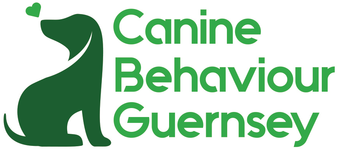
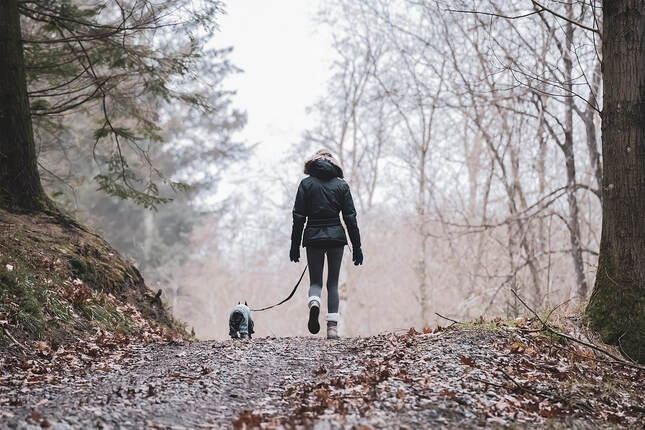



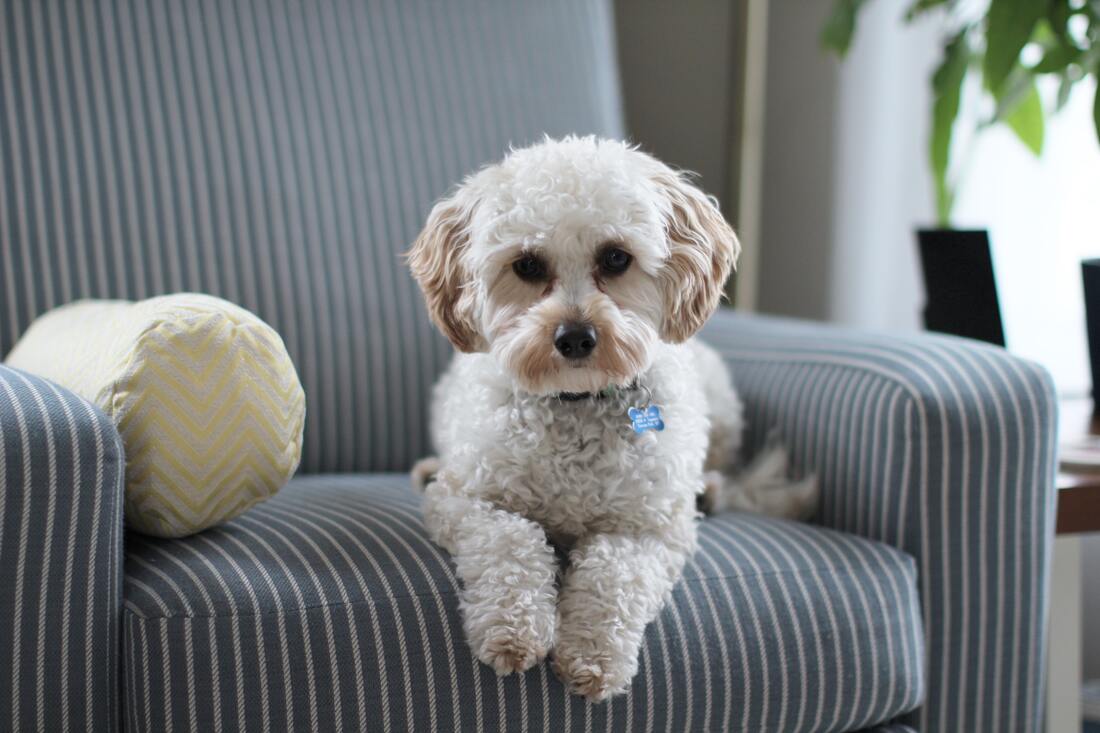
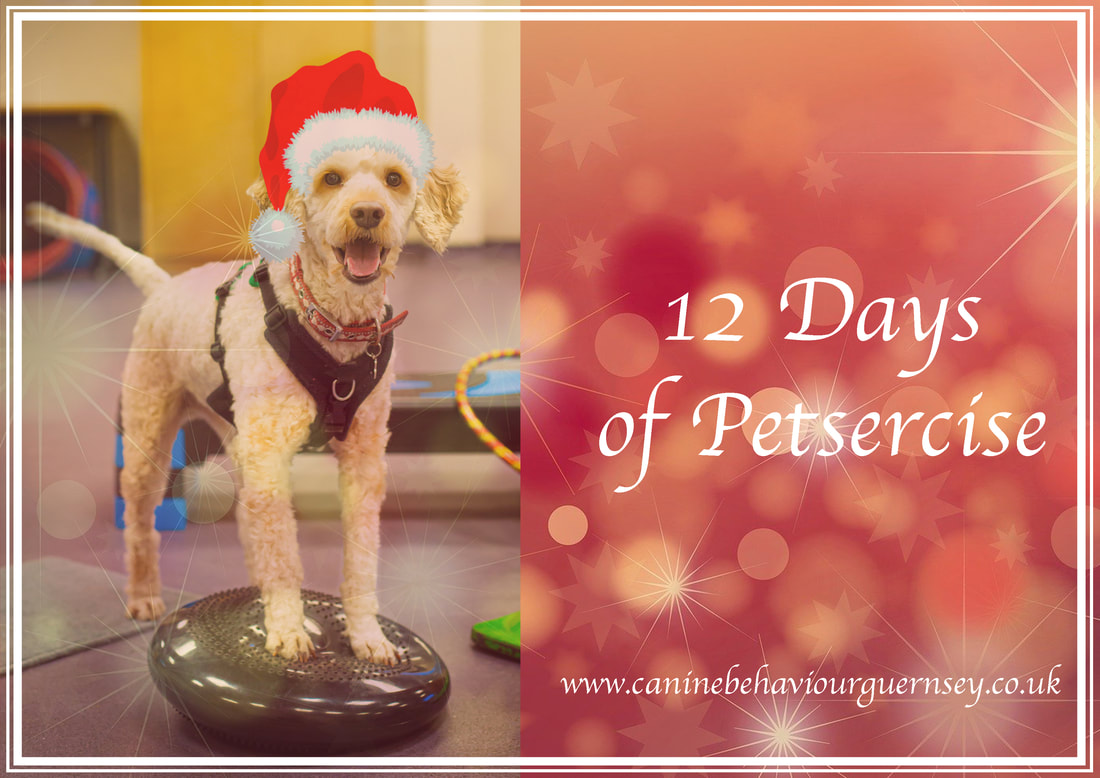
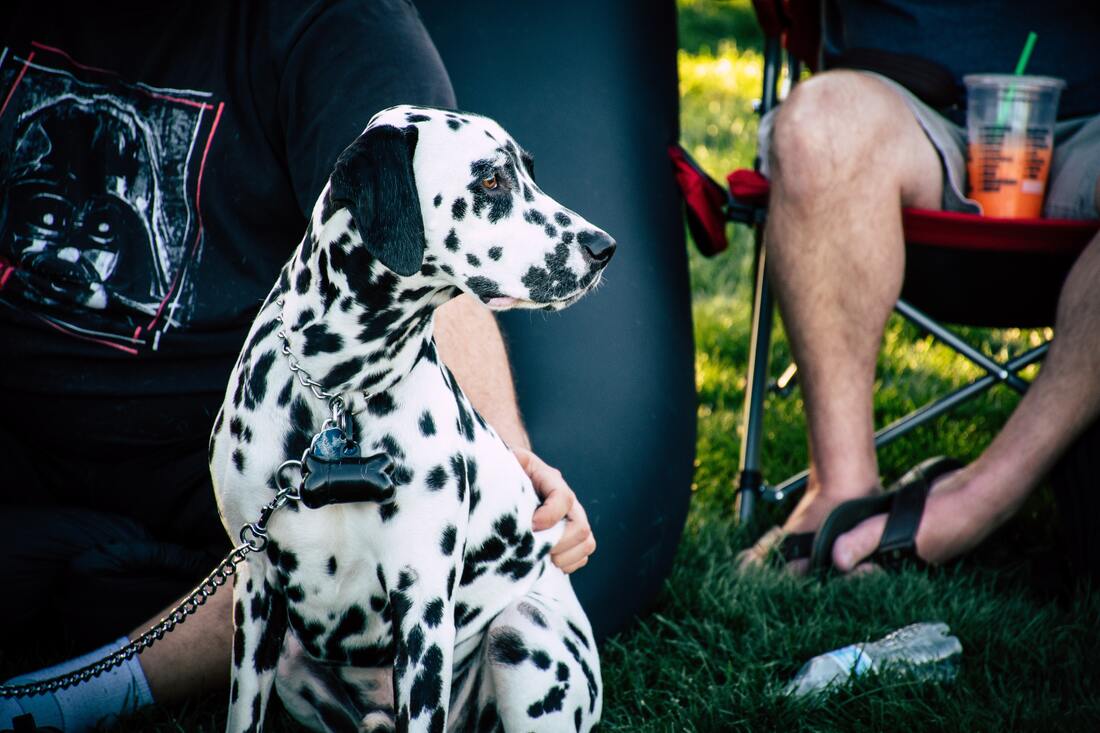
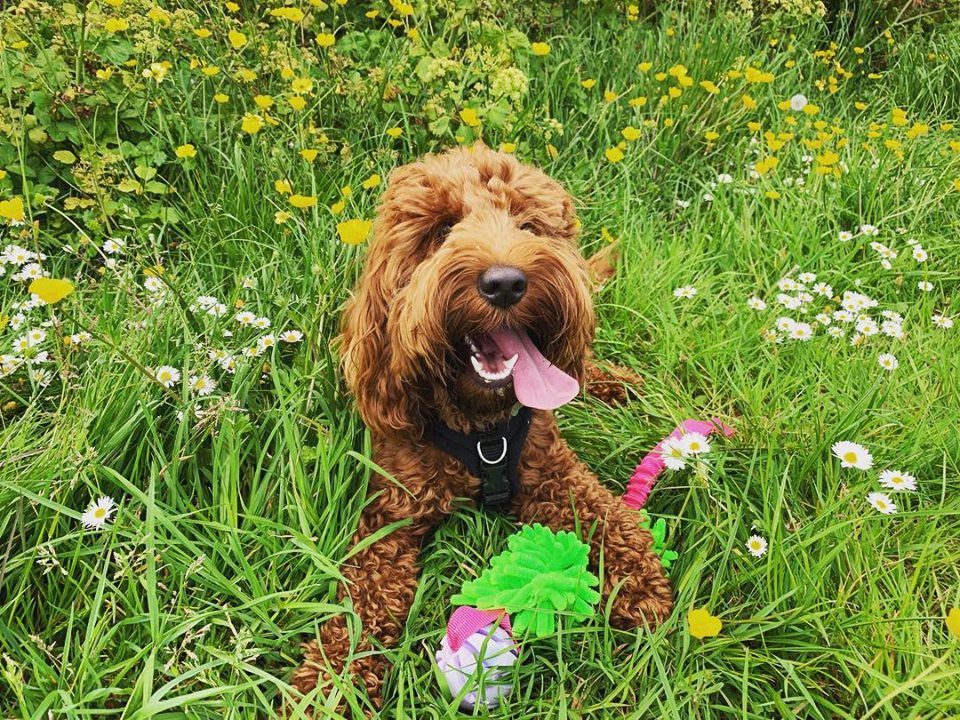

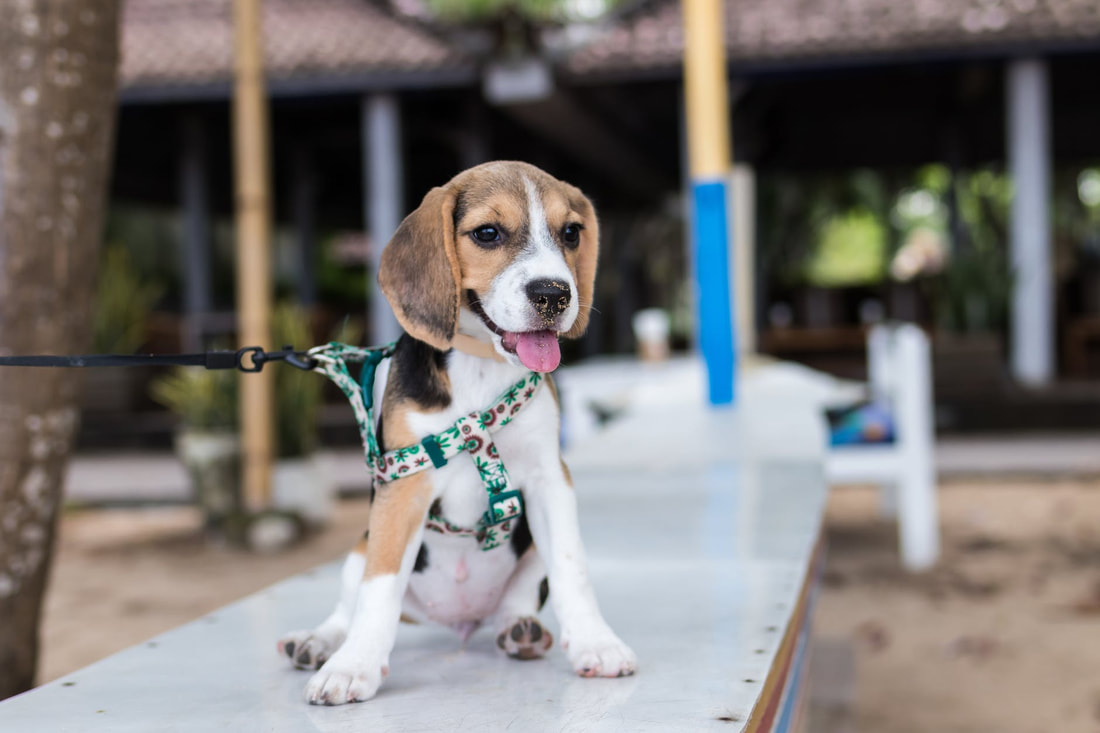
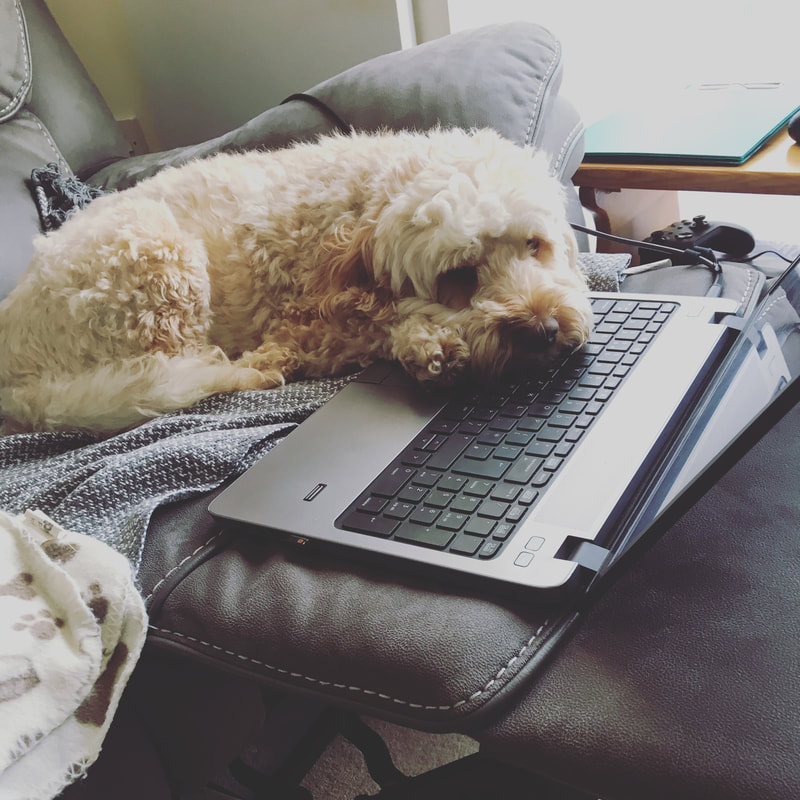
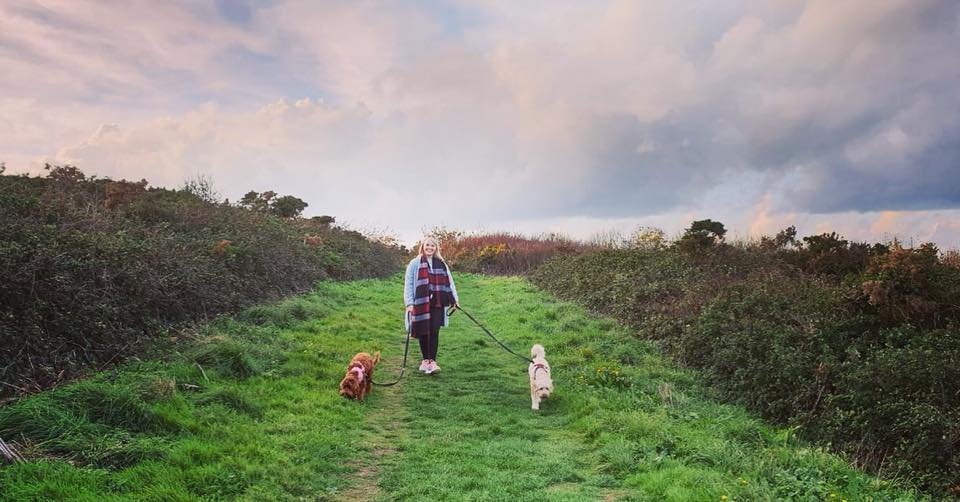

 RSS Feed
RSS Feed